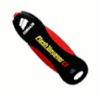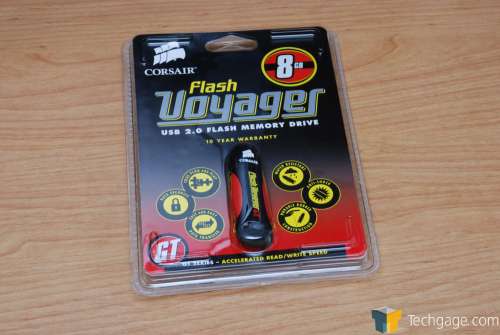- Qualcomm Launches Snapdragon 4 Gen 2 Mobile Platform
- AMD Launches Ryzen PRO 7000 Series Mobile & Desktop Platform
- Intel Launches Sleek Single-Slot Arc Pro A60 Workstation Graphics Card
- NVIDIA Announces Latest Ada Lovelace Additions: GeForce RTX 4060 Ti & RTX 4060
- Maxon Redshift With AMD Radeon GPU Rendering Support Now Available
Corsair Voyager GT 8GB

Corsair announced new flash media at this years CES and amongst their new product line-up is their Voyager GT. Though not a replacement for their original Voyager series, the GTs have one specific goal: performance.
|
|
If there is one invention we could all appreciate, it’s the thumb drive. The ability to carry around your important documents or music on your keychain anywhere you go… is amazing. It sure beats carrying along a CD-Rom. Not to mention CD cases can really dig into your skin…
When first introduced, thumb drives were expensive. Incredibly. Even just a few years ago I recall seeing a 4GB thumb drive in the store, but it retailed for well over $400. Today, we can find a variety of 4GB drives for a measly $50. Not bad, considering it’s essentially the equivalent of 6 CD-Roms squeezed into the size of something that hangs off your keychain. As these drives get larger though, performance tends to decrease. This was first combated with the introduction of thumb drives with dual channel memory. This was not a bad move… it increased the speed considerably.
While many companies have 8GB thumb drives on the market, many are slow… very slow. Corsair doesn’t think that should be the case though, which is why they introduced their Voyager GT series. The GT has similar goals as the original Voyager, except it’s sole focus is performance. As we will see in our tests, this is made quite clear.
Corsair’s Voyager series has become known as being the most durable thumb drive series on the market. There have been countless reviews on the web where people have thrown their drives off of buildings, put them in a freezer, slightshot them at a building and even run them over with a car. After all this hassle the drive has to go through, more often than not, they will still function. They may look horrible afterwards, but so would you if you were run over by a vehicle.
That said, I won’t be putting the drive through any "torture" tests, because the point has been proven many times before. Today, I will be pitting this thumb drive against previously reviewed thumb drives, including OCZs Rally 4GB and even Corsairs own Voyager 4GB that we reviewed in late 2005. First though, let’s take a look at what you will receive when you get the Voyager GT.
Thanks to the tight plastic blister pack, the packaging can be rough handled and still arrive at your door in great shape. The packaging is identical to previous Voyager packaging, except for the red color of course.
Included is the Voyager itself in addition to a USB extension cable and also a lanyard. Security software used to be included on a mini CD-Rom, but is now located on the thumb drive itself. So, when you first plug the drive in, don’t format it without grabbing the software first.
In order to test the Voyager GT, I ran it through a few popular benchmarks and also a few real world transfer tests. I do not have another thumb drive to compare to, so I will be using results from earlier reviews for our benchmarking tests. Real world tests will be exclusive to this review though.
HD Tach is the first benchmarking tool that comes to mind when reviewing thumb drives. It’s perfect because it offers both read and write test results and spits out a nifty looking graph at the same time. All results are in MB/s.

HD Tune is another tool we use frequently here. It’s lightweight and makes benchmarking any media a very simple task.

Nothing is more appropriate in a thumb drive review than a few real world transfer tests. For this, I took a group of files that I also used in our recent Seagate Momentus 7200.2 160GB review. Luckily enough, our huge 7.01GB folder fits on Corsairs Voyager with room to spare. Here are the four sets of files used:
|
Test
|
Result
|
| 7.01GB Folder (5,549 Files) | 10m 19s |
| 1.08GB Folder (583 Files) | 1m 06s |
| 1.08GB File | 44s |
| Sandra Result | 33MB/s |
| HD Tach Latency | 0.8ms |
Great results overall. Copying from the hard drive to the USB thumb drive was faster than some of the notebook drives we’ve tested!
Corsair has a winner with their Voyager GT. By far, it’s the fastest USB thumb drive available while boasting an impressive 8GB of storage space. So what do you pay for the benefit of fast performance? Quickly checking out a popular e-tailer, I found the original 8GB Voyager to be selling for $80, while the GT version sells for $15 more. I can’t speak on specs of their original 8GB Voyager because I have not used it, however their 4GB Voyager which I did own was rated for 18.5MB/s. This GT is near twice that.
One thing to bear in mind though, is that you will not want to be carrying around 4GB ISOs or DVD rips, since it’s not possible to use files greater than that size on the FAT32 file system. It is possible on NTFS and ext3 however. So if you plan on using the thumb drive exclusively on Windows machines and want to use files greater than 4GB, you can use GParted or a partitioner capable of handling thumb drives and format it to NTFS that way.
Without question, the extra speed that the GT offers is worth that little price difference to me. You will have to decide which is more valuable to you. Of course, if you prefer space over performance, you could always pick up Corsairs own 16GB Voyager which sells for around $140. Kudos to Corsair for this great product release, and I have to say they chose a great color to represent the speed.
If you have a comment you wish to make on this review, feel free to head on into our forums! There is no need to register in order to reply to such threads.


|
|
Support our efforts! With ad revenue at an all-time low for written websites, we're relying more than ever on reader support to help us continue putting so much effort into this type of content. You can support us by becoming a Patron, or by using our Amazon shopping affiliate links listed through our articles. Thanks for your support!







